Are you receiving a sign-in prompt every time you open Microsoft Office programs? If yes, the suggestions in this article may help you fix it. This issue can occur on any Microsoft Office application, including Outlook, Word, Excel, etc. Different Microsoft Office users have experienced this issue on different Office applications. According to them, Microsoft Office keeps asking them to sign in when they open Outlook, PowerPoint, Excel, or another Office application.
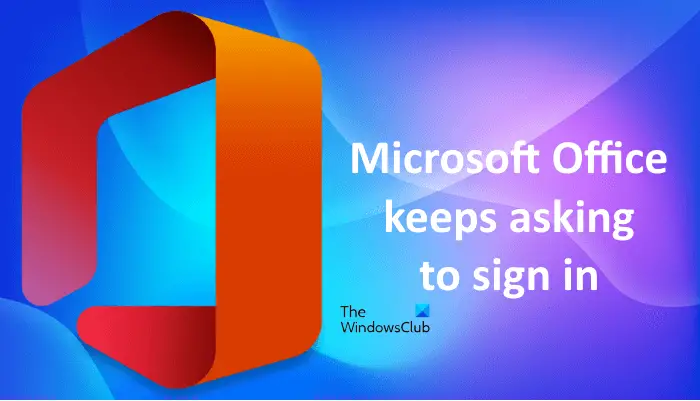
Microsoft Office keeps asking to sign in
If Microsoft Office keeps asking you to sign in, you can try the following solutions to get rid of the problem.
- Update Microsoft Office
- Disconnect and reconnect your Work or School account
- Check whether the “Always prompt for logon credentials” option is disabled or not
- Delete your credentials
- Change OneDrive settings
- Reset OneDrive
- Create new values in Registry
- Delete the Identity folder in Registry
- Delete the cached files from Office Upload Center
- Run an online repair
Let’s see all these fixes in detail.
1] Update Microsoft Office
First, check whether you are using the latest version of Microsoft Office or not. The following steps will help you with that:
- Open the Microsoft Office application you are experiencing the issue with.
- Go to “File > Account.”
- Click on the Update Options drop-down and select Update Now. You will find this drop-down under the Product Information section.
After updating Office, check if the issue persists.
2] Disconnect and reconnect your Work or School account
Disconnect and reconnect your Work or School account and see if it helps. To do so, you have to open Windows 11/10 Settings. The steps for the same are listed below:
- Open Settings.
- Go to “Accounts > Access work or school.”
- Select your Work or School account and click on the Disconnect button.
This will remove your Work or School account from your Windows 11/10 computer. Now, add your Work or School account again.
3] Check whether the “Always prompt for logon credentials” option is disabled or not
If you are receiving this issue on Outlook, check whether the “Always prompt for logon credential” option is disabled or not. Follow the steps written below:
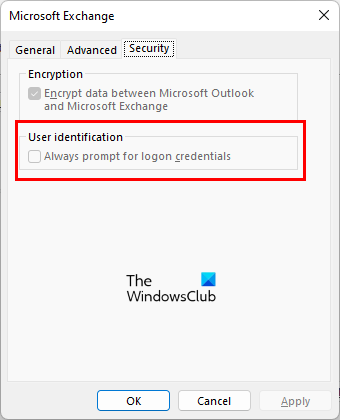
- Open Microsoft Outlook.
- Go to “File > Info > Account Settings.”
- Click Account Settings again.
- Select your Outlook account under the Email tab and click Change.
- Now, click More Settings.
- Select the Security tab and uncheck the “Always prompt for logon credentials” option under the User Identification section.
If the option is already unchecked or greyed out, you have to delete your credentials in the Credential Manager.
4] Delete your credentials
Deleting the Microsoft Office credentials from the Credential Manager has helped many users. You should also try this. We have listed the steps below:
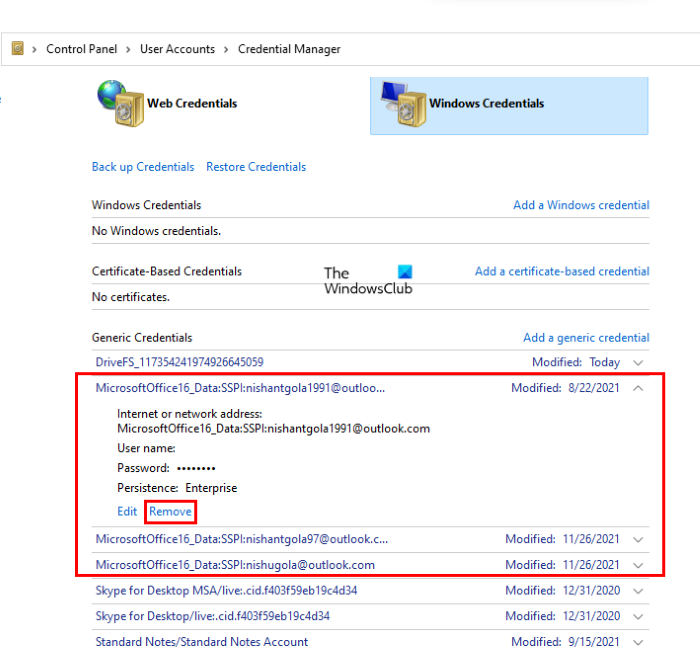
- Open the Control Panel.
- Change the View by mode to Category.
- Click User Accounts.
- Now, click Credential Manager and then select Windows Credentials.
- Delete all the credentials with the name MicrosoftOffice.
After deleting the credentials, open the Microsoft Office application. You will get the sign-in prompt. Enter your credentials and sign in. Now, close the Office app and then open it again. It should not ask you to sign in again.
Read: Fix Access denied to installation source Office error.
5] Change OneDrive settings
The sync for Office files option in OneDrive lets you work on Office files with other people and share documents at the same time. However, due to a sync conflict, users may experience issues with Office applications, such as crashing or closing unexpectedly, asking for the sign-in prompt again and again, etc.
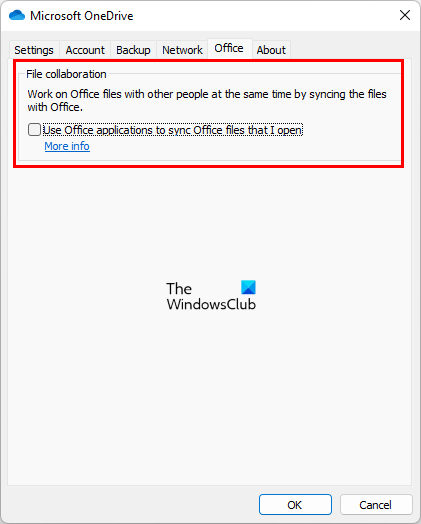
Change OneDrive settings to disable this feature and see if this fixes your problem. Follow the below-listed instructions:
- Right-click on the OneDrive icon.
- Go to “Help & Settings > Settings.”
- Select the Office tab.
- Uncheck the “Use Office applications to sync Office files that I open” checkbox.
- Click OK.
6] Reset OneDrive
Reset OneDrive to fix OneDrive problems. Before resetting the OneDrive, you have to clear the OneDrive credentials from the Credential Manager.
To delete OneDrive credentials, open the Control Panel and then go to “User Accounts > Credential Manager > Windows Credentials.” Now, delete all the credentials with the name OneDrive. After deleting the OneDrive credentials, reset OneDrive.
7] Create new Values in Registry
This is a registry fix for the problem you are experiencing with Microsoft Office applications. Therefore, before you begin, we recommend you create a system restore point and backup your registry.
Perform the below steps carefully. Any incorrect entry in Windows Registry can cause serious damage to your system.
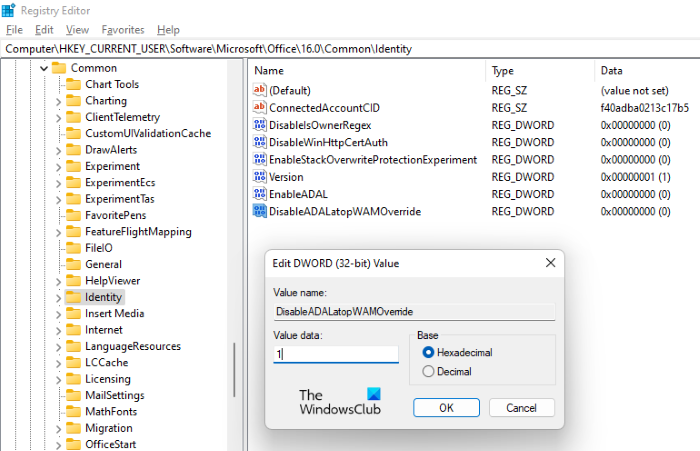
Press Win + R keys to launch the Run command box. Type regedit and click OK. Click Yes in the UAC prompt.
Copy the following path and paste it into the address bar of the Registry Editor. After that, hit Enter.
HKEY_CURRENT_USER\Software\Microsoft\Office\16.0\Common\Identity
Make sure that you have selected the Identity key on the left side. Now, click in the empty space on the right side and go to “New > DWORD (32-bit) Value.” Right-click on the newly created value and name it EnableADAL. Double-click on EnableADAL and enter 0 in its Value Data. After that, click OK.
Similarly, create another DWORD (32-bit) Value in the Identity key with the name DisableADALatopWAMOverride and enter 1 in its Value Data. Click OK.
Now, check if you receive a sign-in prompt again and again. If the issue still persists, go to the following registry path and create one more DWORD (32-bit) Value there.
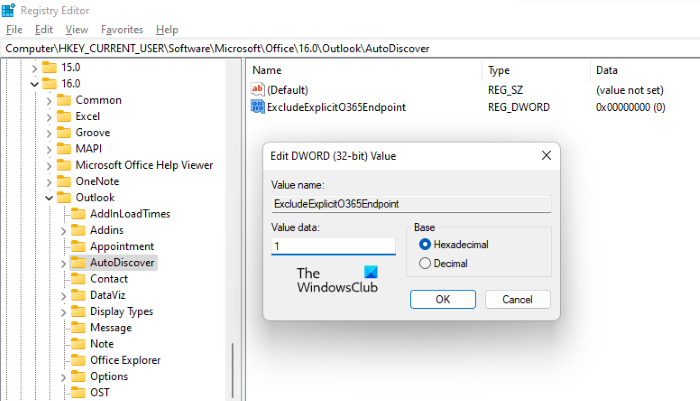
HKEY_CURRENT_USER\Software\Microsoft\Office\16.0\Outlook\AutoDiscover
Now, create a new DWORD (32-bit) Value named ExcludeExplicitO365Endpoint. Change its Value Data to 1. Click OK to save the settings. After that, restart Outlook.
This should fix the problem.
8] Delete the Identity folder in Registry
If creating the new Values in Registry does not fix your problem, deleting the Identity folder may help. Many users have accepted that this solution has fixed their problem. Before making any changes to the registry it is always better to create a system restore point and back up the registry.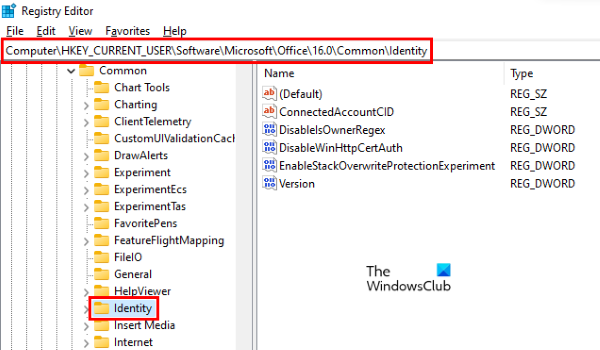
The steps are as follows:
First, clear MicrosoftOffice credentials from the Credential Manager. We have already talked about this previously in this article.
After clearing the credentials, open the Registry Editor and go to the following path.
HKEY_CURRENT_USER\Software\Microsoft\Office\16.0\Common
Expand the Common key and look for the Identity folder. Once you find it, delete it. After deleting the Identity folder, restart your computer.
9] Delete the cached files from Office Upload Center
The problem might be occurring due to the corrupted cached files in the Office Upload Center. Office Upload Center is a part of Microsoft Office and gets installed on your system automatically when you install Microsoft Office. The Office Upload Center lets users keep track of their files getting uploaded to the server. If the cached files in the Office Upload Center get corrupted due to any reason, you will experience issues with Microsoft Office applications.
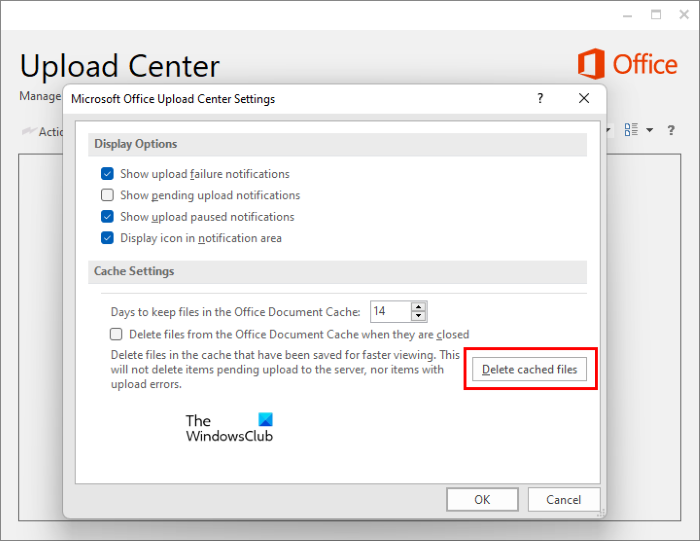
Delete the cached files in the Office Upload Center and see if it works. The steps for the same are written below:
- Click Windows Search and type Office 2016 Upload Center (replace the version accordingly).
- Click the Office Upload Center from the Search Results.
- Click Settings.
- Now, click Delete cached files under the Cache Settings section.
10] Run an online repair of Office
If none of the above solutions work for you, run an Online repair for Microsoft Office. To run the online repair, you should have an internet connection.
Read: Microsoft Account keeps asking for password
Why does Office keep asking for my password?
Microsoft Office keeps asking you for your password when the Logon network security setting under the Security tab of the Microsoft Exchange dialog box is set to a value other than Anonymous Authentication. This issue is generally associated with the older versions of Microsoft Office but can occur rarely on the latest versions.
To fix this issue, you have to select the Anonymous Authentication in the Logon network security setting. Users with the newer versions of Office may not find this option. Hence, they can try other fixes like deleting their credentials, deleting the Identity folder in Registry, etc.
You can also try the solutions described above in this article.
How do you get Microsoft to stop asking me to sign in?
If Microsoft Office keeps asking you to sign in, first, you should update it. If updating Office does not fix the problem, you can try other fixes like, deleting your credentials, resetting OneDrive, deleting the cached files from office Upload Center, etc.
We have explained all these fixes in detail above in this article.
Hope this helps.
Read next: Fix Office doesn’t recognize the command it was given error message.